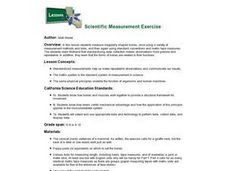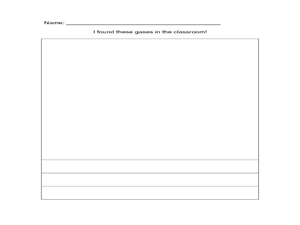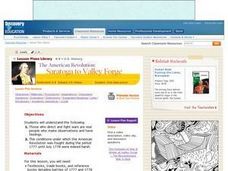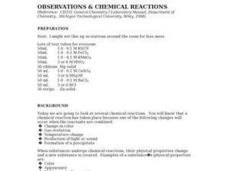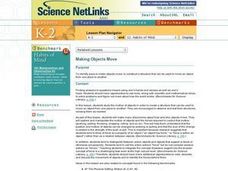Curated OER
The Mystery of the Missing Hummingbirds
Students record scientific observations in a science journal. In this season activity, students make observations about each of the seasons and record in their journals. Students record organisms response to seasonal changes...
Curated OER
One Good Turn Deserves Another
Young scholars make observations about shapes and 1-, 2-, and 3-dimensional objects. They conduct observations and make predictions regarding transformations of simple geometric shapes. They identify shapes that occur in household items.
Curated OER
Algae Part One: An Introduction
Young scholars have the opportunity to view two types of algae under 400x magnification with a compound microscope. They make observations and record their observations through drawings and words. In addition, they identify different...
Curated OER
What Do We Learn From the Repartiation of Alaska Native Artifacts?
Students observe and evaluate evidence of Alaska Native cultural symbols and artifacts. They research historical data from a variety of primary resources, including the Harriman expedition journals, related web sites, oral accounts,...
Curated OER
Calamity Sane
Students observe responses to emergency situations by participating in and making observations about a fire drill. They then analyze the fire drill proceedings from the perspective of a sociologist investigating social order during...
Curated OER
Me And My Shadow
Students investigate the concept of a shadow. They design a tool to create shadows for an experiment. They make observations and record the size and shape of shadows. The lesson contains background information for the teacher to deliver...
Curated OER
Scientific Measurement Exercise
Students measure irregularly shaped bones, once using a variety of measurement methods and tools, and then again using standard conventions and metric tape measures. They explore firsthand that standardizing data collection makes...
Curated OER
Classifying Conundrum
Fourth graders identify plant characteristics from different environments and communicate that information in different ways. They use a simple scheme to classify Utah plants and animals and make observations and record them in a...
Curated OER
Culture Collage
Students investigate their cultural heritage and make observations on how much influence their past has on their current values and lifestyle. They brainstorm a list of things that represent a certain country or cultural heritage and...
Curated OER
Matter: Solids Liquids and Gases
Students participate in a science experiment to understand that matter takes up space. In this matter lesson, students experiment with solids, liquids and gases to recognize that matter is everywhere. Students make observations and...
Curated OER
What is the purpose of Karyotyping?
Students explain how karyotyping is used to diagnose specific genetic disorders. They use karyotypes to make observations and analyze chromosomal errors. This activity can be completed online or without computer access.
Curated OER
How Can You Predict the Characteristics of an Unborn Baby?
Learners compare three sets of unlabeled human chromosomes and gather related data, trace chromosomes to pair them, and make observations about them.
Curated OER
The American Revolution: Saratoga to Valley Forge
Middle schoolers comprehend that people who who direct and fight wars are real people who make observations and have feelings. They comprehend the conditions under which the American Revolution was fought during the period 1777 until...
Curated OER
Alcohol: Separating Fact from Fiction
Students obtain a clearer understanding of their knowledge about alcohol, recognize that their attitudes, beliefs, & knowledge about alcohol may be different from their peers, and gain experience with scientific methods.
Curated OER
How Are Soils Classified?
Learners list the three texture groups that classify soils. They classify a soil sample as sandy, silty or clay soil.
Curated OER
Corn Cob Painting
Students explore creativity and imagination. In this lesson about art, students experiment with different tools used for creating prints. Students use ears of corn with kernels and without kernels, tempera paint, paper plates for the...
Curated OER
The Shape of Things
Sixth graders read and discuss information regarding the shape and attributes of an eggshell. In this shape of things lesson plan, 6th graders gather relevant information that pertains to the incubation and formation of an...
Curated OER
Push or Pull
Students examine a large box and determine how they may move the box to a specified point. After the class makes predictions, they test them and decide what worked and what didn't work. Through their tests, push and pull are introduced....
Curated OER
Halloween Literature Unit: Pumpkin Patch Unit Project
Students simulate an agriculture project. In this sequencing lesson, students observe their classroom pumpkin patch, make journal entries, and predict how the pumpkins will grow. They discuss as a class how to keep their pumpkins safe...
Curated OER
Our Five Senses Affect Food Choices
Learners read My Five Senses: A Lion's Tale. In this five senses lesson, students understand the relationship between their five senses and how they affect their food choices. Learners write journal entries about their senses and the...
Curated OER
Observations & Chemical Reactions
Students conduct a series of experiments in which they explore chemical reactions. They detect chemical changes by observing how physical properties change when two different chemicals are combined. They list and describe the reactants...
Curated OER
Make A Thunderstorm!
Students create a thunderstorm by putting ice cubes and food coloring into a container and observe what happens to the food coloring. For this thunderstorm lesson plan, students discuss the cause and effects of thunderstorms and then...
Curated OER
Making Objects Move
Pupils will make many discoveries about how and why objects move. They will explore and manipulate the motion of objects and the forces required to control that motion (pushing, pulling, throwing, dropping, rolling, and so on). This will...
It's About Time
Making Waves
Young scientists use Slinkys to better understand waves. After creating and measuring many aspects of waves, they complete a handout and homework questions. The resource also introduces the final project for the chapter, though...
Other popular searches
- Making Observations Science
- Making Observations Biology
- Ell Making Observations
- Making Observations in Science
- Ell + Making Observations








